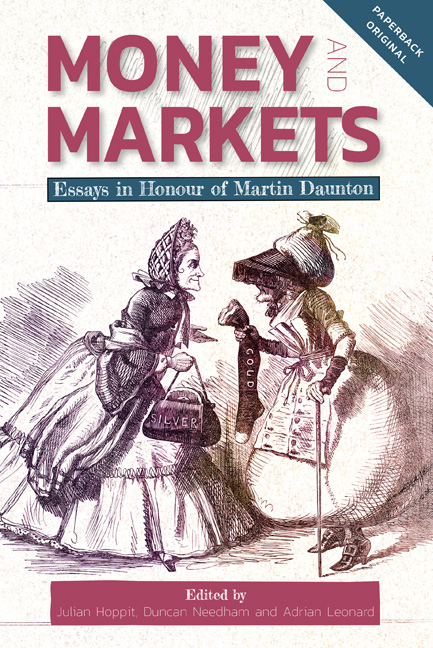Book contents
- Frontmatter
- Contents
- List of Figures
- List of Tables
- List of Contributors
- List of Abbreviations
- Introduction
- 1 Taxing London and the British Fiscal State, 1660–1815
- 2 Rents, Squalor, and the Land Question: Progress and Poverty
- 3 Marine Insurers, the City of London, and Financing the Napoleonic Wars
- 4 The Political Economy of Sir Robert Peel
- 5 Champagne Capitalism: France’s Adaptation to Britain’s Global Hegemony, 1830–80
- 6 The 1848 Revolution in Prussia: a Financial Interpretation
- 7 Imperial Germany, Great Britain and the Political Economy of the Gold Standard, 1867–1914
- 8 Knowledge, Contestation and Authority in the Eurodollar Market, 1959–64
- 9 Continuity and Change in British Conservative Taxation Policy, c. 1964–88
- 10 Britain Since the 1970s: a Transition to Neo-Liberalism?
- 11 Maplin: the Treasury and London’s Third Airport in the 1970s
- 12 Workfare and the Reinvention of the Social in America and Britain, c. 1965 to 1985
- 13 Charity and International Humanitarianism in Post-War Britain
- 14 Discounting Time
- 15 The Material Politics of Energy Disruption: Managing Shortages Amidst Rising Expectations, Britain 1930s–60s
- The Published Writings of Martin J. Daunton
- Index
- People, Markets, Goods: Economies and Societies in History ISSN: 2051-7467
1 - Taxing London and the British Fiscal State, 1660–1815
Published online by Cambridge University Press: 13 April 2021
- Frontmatter
- Contents
- List of Figures
- List of Tables
- List of Contributors
- List of Abbreviations
- Introduction
- 1 Taxing London and the British Fiscal State, 1660–1815
- 2 Rents, Squalor, and the Land Question: Progress and Poverty
- 3 Marine Insurers, the City of London, and Financing the Napoleonic Wars
- 4 The Political Economy of Sir Robert Peel
- 5 Champagne Capitalism: France’s Adaptation to Britain’s Global Hegemony, 1830–80
- 6 The 1848 Revolution in Prussia: a Financial Interpretation
- 7 Imperial Germany, Great Britain and the Political Economy of the Gold Standard, 1867–1914
- 8 Knowledge, Contestation and Authority in the Eurodollar Market, 1959–64
- 9 Continuity and Change in British Conservative Taxation Policy, c. 1964–88
- 10 Britain Since the 1970s: a Transition to Neo-Liberalism?
- 11 Maplin: the Treasury and London’s Third Airport in the 1970s
- 12 Workfare and the Reinvention of the Social in America and Britain, c. 1965 to 1985
- 13 Charity and International Humanitarianism in Post-War Britain
- 14 Discounting Time
- 15 The Material Politics of Energy Disruption: Managing Shortages Amidst Rising Expectations, Britain 1930s–60s
- The Published Writings of Martin J. Daunton
- Index
- People, Markets, Goods: Economies and Societies in History ISSN: 2051-7467
Summary
This chapter contributes to two of Martin Daunton's main research interests: urban history and the history of taxation. It explores the fiscal importance of London to central government, but not, as is usually the case, with regard to the financial institutions of ‘the City’, capital markets, and the money supply. Instead it considers the amounts of taxes collected in and around the capital. The spectacular growth in taxation for central government in this period is often ascribed to the ability of the excise service to extract revenue from across the length and breadth of the country. By contrast this chapter shows that very large amounts of taxes were collected in and around the capital. This requires significantly amending usual interpretations both of the nature of Britain's fiscal state and of London's importance to national economic developments.
As is well known, this period saw a dramatic transformation in public finances. In 1670 Charles II was so desperate for funds that he became a pensioner of France; two years later he defaulted on public loans in the ‘Stop of the Exchequer’. But from that nadir public finances began to be transformed, if often by adapting earlier innovations, leading Britain to become one of Europe's most heavily taxed societies. Total taxes collected rose eightfold in real per capita terms from 1664 to 1810, and from 4 to 18 per cent of GNP. This was to meet current spending and the charges on a mushrooming national debt: over the same period the debt rose from zero to 160 per cent of national income. Such resources enabled Britain to wage frequent and increasingly costly wars, both European and imperial, becoming in the process sufficiently powerful to survive the tremendous shocks of the American and French revolutions.
Accounts of London's role in that transformation have concentrated on relations between the City and Whitehall, especially regarding the birth and infancy of the national debt between the Glorious Revolution of 1688–89 and the bursting of the South Sea Bubble in 1720. By contrast, the history of taxation in London has hardly been touched on.
- Type
- Chapter
- Information
- Money and MarketsEssays in Honour of Martin Daunton, pp. 19 - 34Publisher: Boydell & BrewerPrint publication year: 2019



